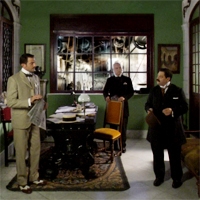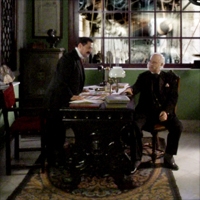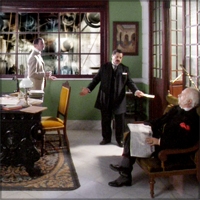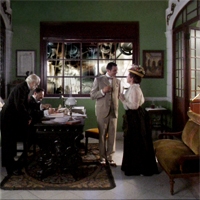-
 The indiano
The indianoOn November 10, 1901, the municipal elections were held in Spain. The victorious party in Valencia was the Republican Fusion party, founded four years earlier by Vicente Blasco Ibáñez. The bipartisan system, which had sustained the the Bourbon Restorations, began to crack as new groups and movements characterized by radical socialist and republican ideas appeared. The trade unions played a funamental role in the consolidation of these ideas.
-
 The factory
The factorySome Valencians made their fortunes in Cuba and returned as borgeois with fierce entrepreneurial sprits, investing their earnings in land, industry, and city services (as the city was undergoing a process of renovation at the time). Thanks to this push, agriculture was further developed with respect to exporting citrus fruits and wine, industries such as leather, ceramics, lumber, and metallurgy grew, and important investments in public works and buildings were made.
-
 The market
The marketThe Spanish economy was hotly debated throughout the 19th century and saw support for both free trade and protectionism, two distinct ways of understanding trade that had important consecuences for the development of private sectors. The former defended free mercantile exchange between countries, and was the cause that ignited competition and industrial development in Spain up until 1870. Protectionism, on the other hand, established customary tariffs for foreign products with the intention of defending national industries from foreign competition, although in reality this assured market became stagnant instead.
-
 The workers
The workersThe Working conditions for workers at the end of the 19th century were very rough, contributing to a sense of class conciousness and encouraging them to organize into labor unions and leftist political parties. The bourgeois felt their interests were being threatened and doubted the ability of the dynastic parties to stop the growing populist protests, therefore supporting the Church’s initiative to create a Catholic League that attempted to mobilize the townspeople under religion instead.
-
 Bourgeois Leisure
Bourgeois LeisureThe borgeois spent their free time reading, going to the theater and the opera, receiving guests in their homes or riding down the avenue in their buggies. Some channeled their literary curiousities into literary societies such as Lo Rat Penat (“The Bat”), which served as a tribunal for the idealogy of the Renaissance. In summer, one could never forget to get a box seat at the July Fair and visit one’s house at Malvarrosa to go swimming in the sea. Others preferred to spend their time practicing sports, while some found an interest in emerging forms of entertainment such as cinema.
